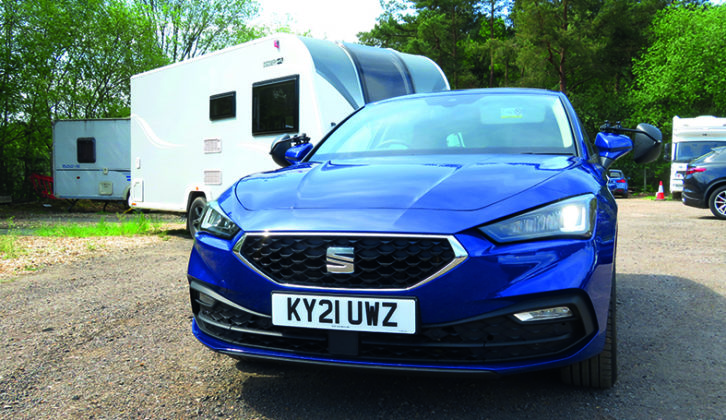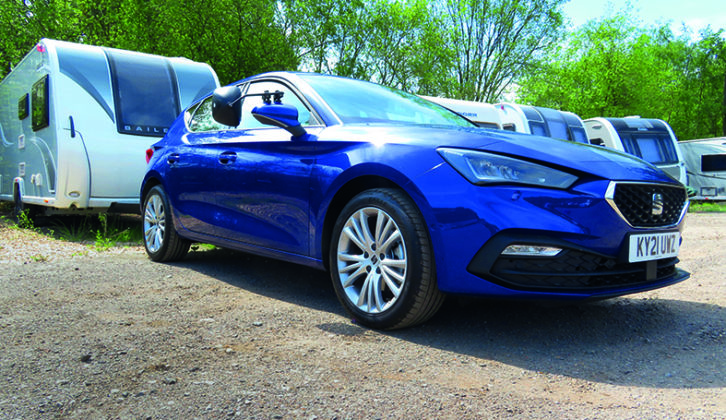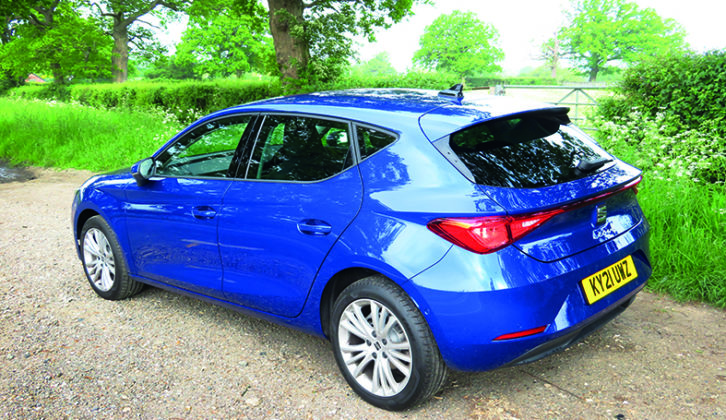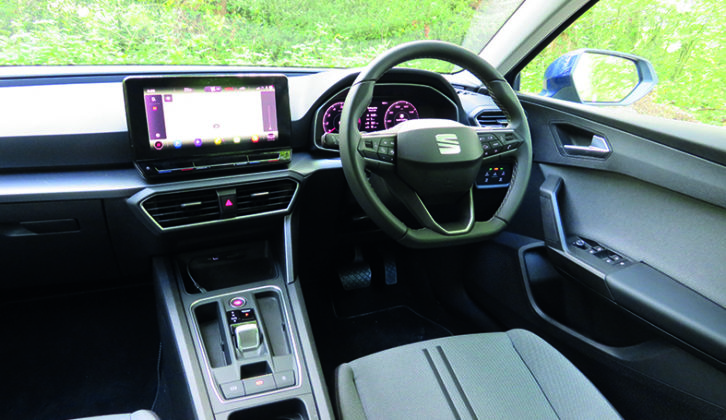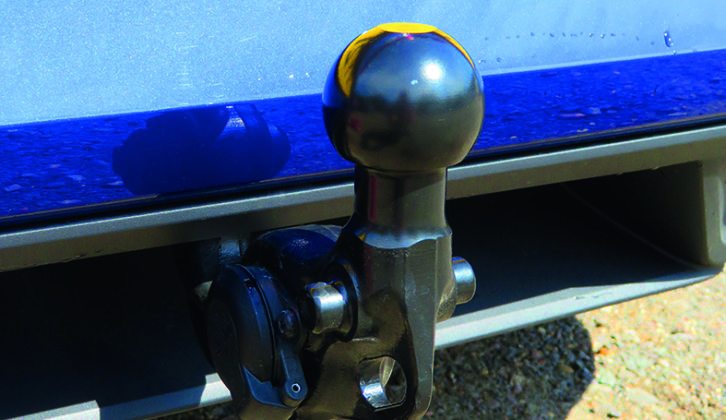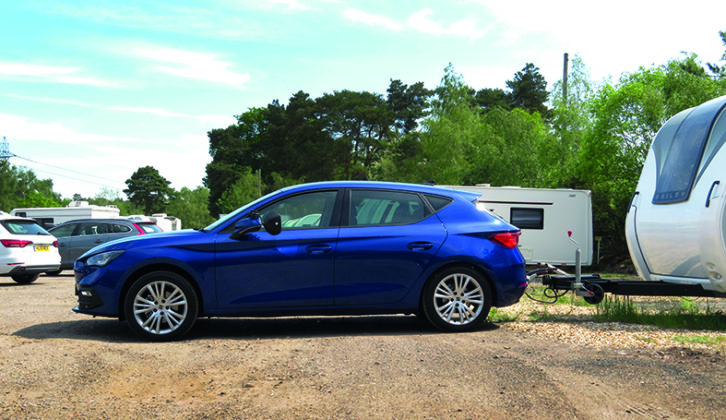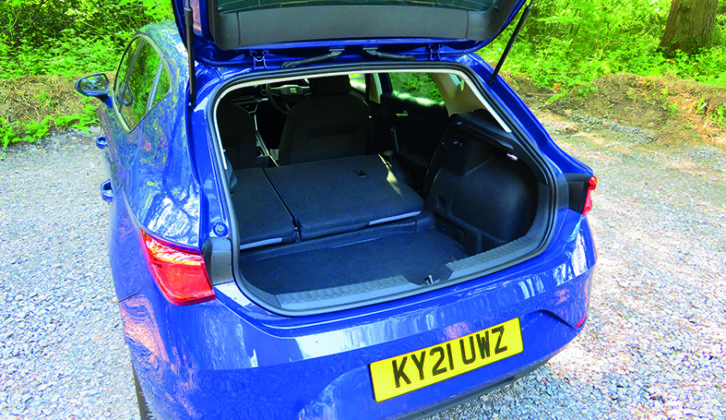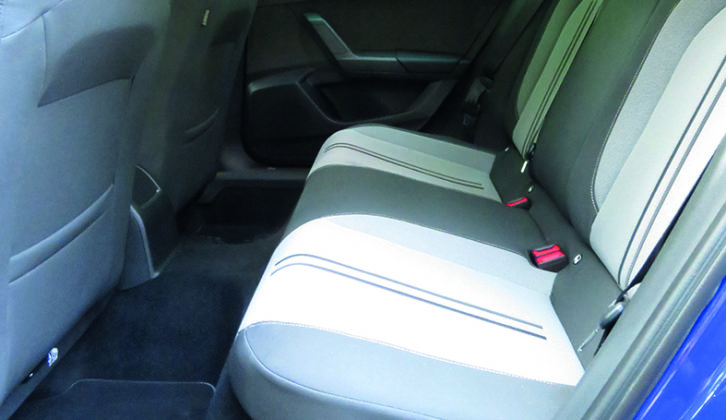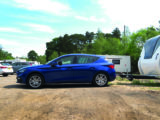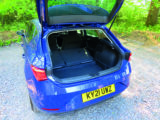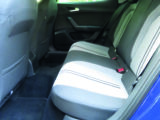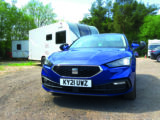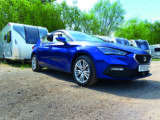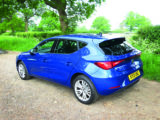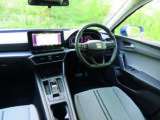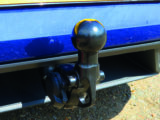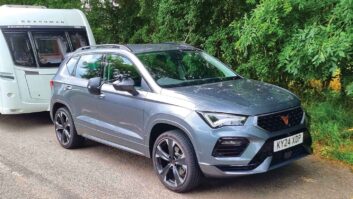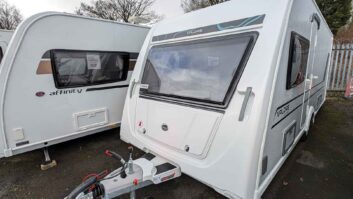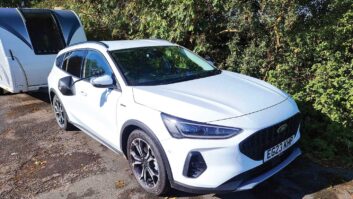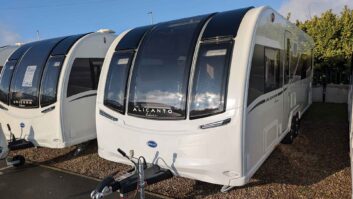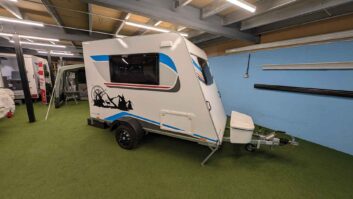It pulled up to 60mph on the motorway with no sign of strain, and happily held this speed in seventh gear on the flat
Seat has launched a fourth generation of the Leon family hatchback and estate. The Leon has grown slightly, so it’s now roomier than before.
There are also some new technology upgrades, with wireless connectivity for Apple CarPlay and Android Auto, as well as an app to give owners remote access to lock and unlock the doors or turn on the indicators to locate it in a car park.
 Watch the video
Watch the videoThere’s a broader choice of powertrain types, with a plug-in hybrid and mild hybrid alongside the more familiar petrol and diesel versions.
We’re driving the mild hybrid, which supplements petrol power with 48V electrical assistance. We’re testing it in SE Dynamic specification, one up from the basic spec and priced at £24,535.
What are we looking for?
The 1.0 eTSI powertrain isn’t particularly powerful. Can it cope with towing?
Towing ability
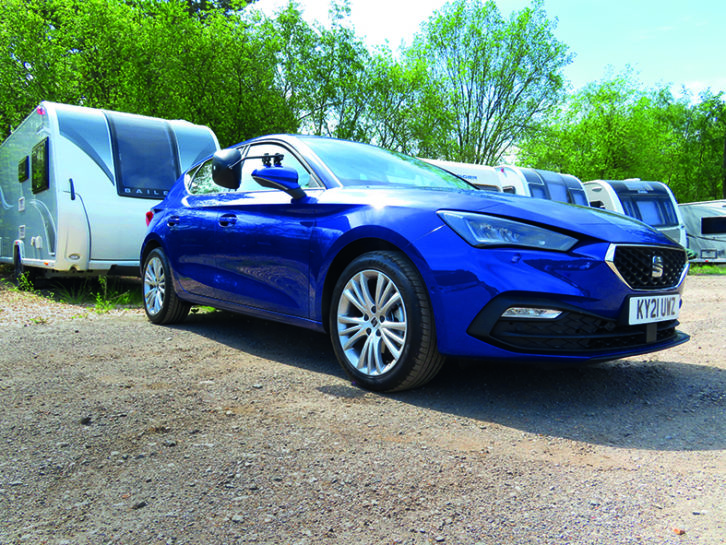
Not so long ago, if you told a friend that you were planning to tow a caravan with a 1.0-litre petrol car, they’d have thought you slightly mad. Perhaps some still would.
Well, the Leon 1.0 eTSI may have a tiny engine, but it’s legally approved to tow caravans and trailers as heavy as 1300kg.
With a kerbweight of 1330kg, we would suggest following the 85% guideline and matching the Seat to a caravan weighing around 1131kg. We paired it with the Bailey Discovery D4-4 from our long-term fleet, which has a MiRO of 1059kg.
The Leon’s engine may be small, but it produces healthy power and torque figures for its size. There’s 148lb ft of torque from as low as 2000rpm, and 110hp if you rev the engine hard.
Seat has fitted a 48V starter-generator system. It won’t allow the car to run on electricity alone, but it can help the engine when accelerating, and allows the car to coast with the engine off without losing power steering or other electrical functions.
The Leon mild-hybrid puts its power to the road through the front wheels, via a seven-speed DSG automatic. If you would rather tow with a manual, you can choose a Leon with the same engine but without miild-hybrid assistance.
With car, caravan, driver and passenger making a total weight of around 2.5 tonnes, you’d think the Leon’s 1.0-litre engine would have its work cut out, with or without battery power. But so long as you’re not expecting fireworks, it actually copes surprisingly well.
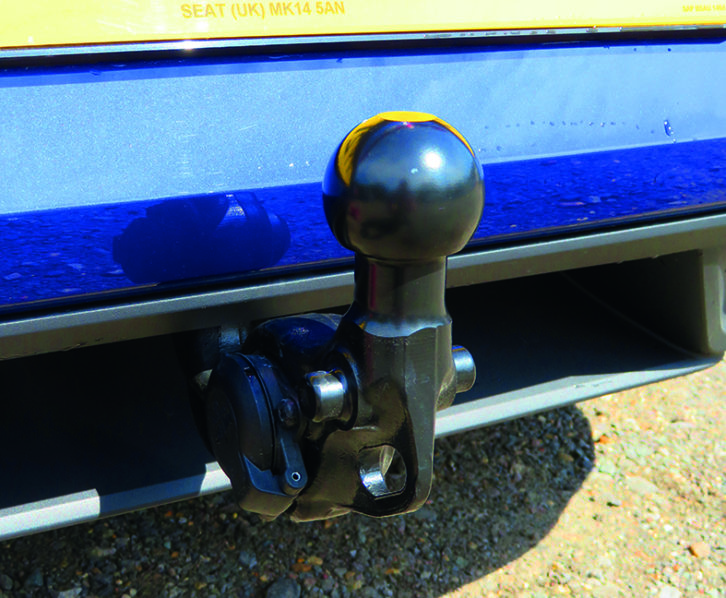
To overtake dawdling traffic when you’re on a single-carriageway road will require patience and a long straight, but otherwise the engine is willing and capable. It pulled up to 60mph on the motorway with no sign of strain, and happily held this speed in seventh gear on the flat.
The gearbox provides ‘drive and sport’ modes, and it’s worth making use of ‘sport’ while towing. The ‘box changes down to a lower gear more readily in ‘sport’, which helps keep momentum on hilly roads. It also makes the car feel more responsive when pulling away from a standstill.
Like most modern cars, the Leon has an electronic handbrake, which securely holds car and caravan still on a slope.
A bit more muscle would help when you’re pulling away on a hill, but being an automatic, there’s no need to juggle clutch and throttle – especially tricky when you’re making a hill start in a small, light car.
Solid acceleration is well matched to reassuring stability. For such a small car, the Leon tows with impressive authority. Even overtaking HGVs, we felt nothing more than a slight bobble from the van.
At low speeds, the auto ‘box makes the Leon easy to manoeuvre, although the thick rear pillars hamper over-shoulder visibility. There are parking sensors front and rear, but no reversing camera, which is a shame if you ever hitch up on your own.
A tyre repair kit is standard first, but this can be upgraded to a compact spare for £115. The towball and electrics, which will set you back £700, drop down from under the back bumper at the push of a button located inside the boot.
Solo driving
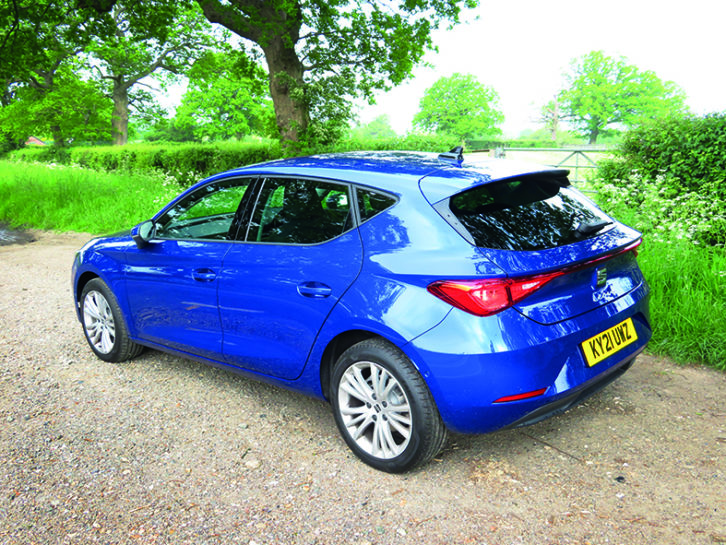
Like the three bears and their porridge, the VW Group caters for different tastes with its mainstream brands: Seat, Škoda and Volkswagen. Seat is the sporty, more youthful brand of the three, and the Leon’s suspension has been developed to suit.
Around town, the ride is on the firm side. It stops short of being harsh, though, and the pay-off is excellent control at speed. well-weighted steering and tidy cornering make the Leon great fun.
In our opinion, it’s right up there with the Ford Focus as one of the most rewarding small hatchbacks for keen drivers.
If you value comfort over cornering prowess, you might wish for a car that’s a bit more forgiving of potholes. But for spirited driving, the Seat’s suspension is well judged.
As when towing, the little 1.0-litre engine feels stronger in solo driving than its on-paper figures suggest. It’s quiet and refined, too. Keep an eye on the rev counter and you can see the mild-hybrid system at work, cutting the engine while coasting and firing up with almost no perceptible noise or vibration.
The hybrid battery is topped up with energy recaptured while braking, and this makes for inconsistent pedal feel. It’s not as easy to slow the car smoothly as it is in a vehicle without regenerative braking. This is a minor complaint, and something you adjust to, the more time you spend in the car.
Space and practicality
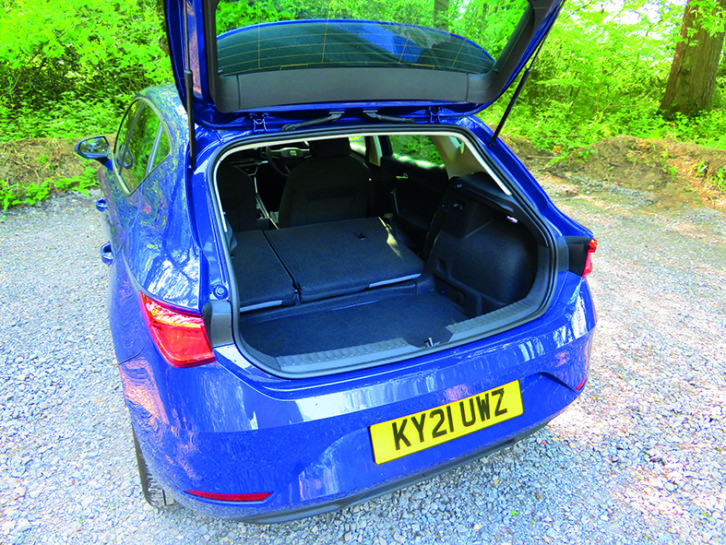
Every Leon, except for the most basic SE is fitted with a fully digital cockpit, with a display screen in place of conventional dials. The information shown can be configured using buttons on the steering wheel.
We shudder at the thought of replacing the screen if it fails out of warranty, but it’s hard not to be impressed with the breadth of useful information. Being able to select a map to sit between the speedo and rev counter, in the drivers line of sight, is especially useful.
With the driver’s seat at the bottom of its adjustment range, you sit very low to the floor, but there’s enough flexibility for a higher position to make getting in and out easier if you’re not so nimble any more. Manual lumbar adjustment is another welcome standard feature.
The SE Dynamic comes with a 10-inch infotainment screen. We feel ease of use has taken a step back with the latest VW Group systems, with complex menus and small icons that require a precise finger press. Touch-sensitive pads for the air con would be better replaced with physical buttons.
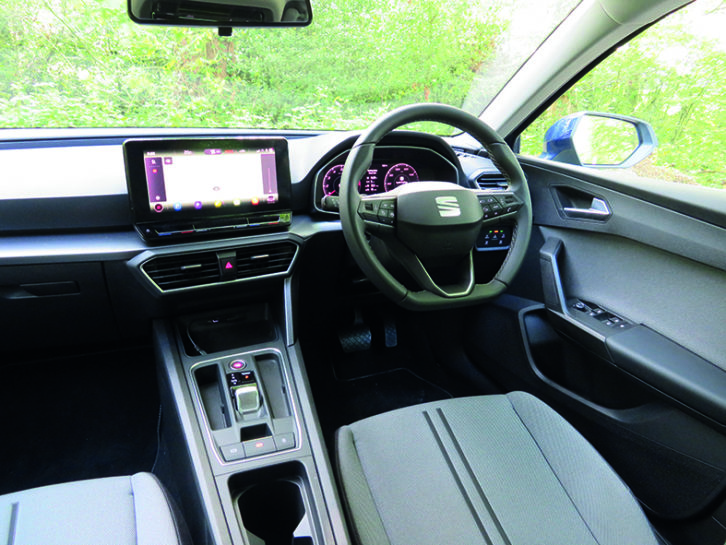
Finish quality is good for a car costing less than £25,000. It’s much of a muchness with the more expensive VW Golf. Head- and legroom are generous throughout, certainly in cars like ours without a sunroof.
Adults can get comfortable in the back, although on a hot day, they might wish for air vents between the front seats or in the door pillars.
Boot space is reasonable, with a 380-litre capacity. That compares with 375 litres for the Ford Focus and 381 litres for the Golf. But there’s a high loading lip and, with the rear seats folded, a step to the floor.
Buying and owning
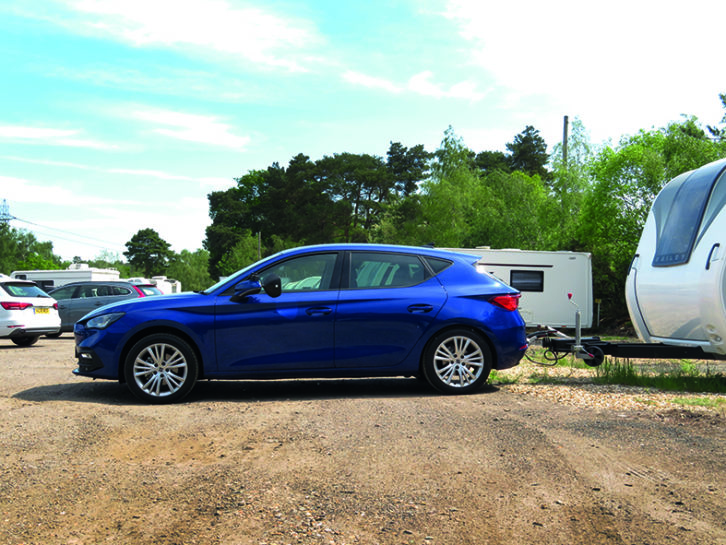
The Leon is keenly priced to begin with, and What Car? suggests that big discounts are available. With persuasion, you should be able to knock £3000 from the price.
Fuel economy is exceptional for a petrol vehicle, with an official combined figure of 45.6-51.4mpg. We had no trouble beating 50mpg on motorway drives. While towing the Bailey, the Seat returned 27.7mpg.
Safety standards are also excellent, with a five-star rating from the experts at Euro NCAP.
The Seat has a three-year/60,000-mile warranty, about the minimum you’d expect, and well beaten by the likes of Hyundai, Kia and Toyota.
Verdict
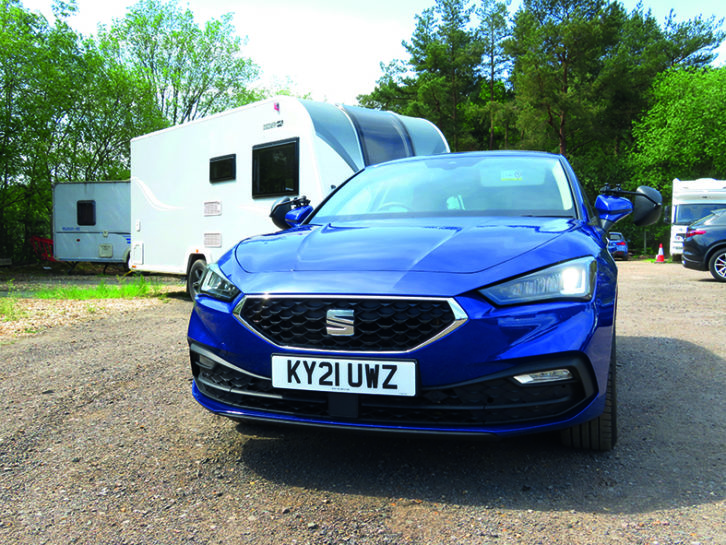
The more we drive the new Seat Leon, the more we like it. In everyday driving, it’s nippy and fun, even with the economy-focused mild-hybrid powertrain. The engine is willing and quiet, and on roads dense with traffic we’re happy with its performance.
What’s more surprising is how well the little engine copes with towing. If you hadn’t checked the outputs beforehand, you’d swear the engine has more muscle than Volkswagen claims. Yes, the Bailey is a small and light caravan, but even so, we’d have no qualms towing long distances with the Seat.
The Leon’s stability at speed rivals that of bigger, heavier vehicles. Perhaps it’s the well-controlled suspension, or the short distance between the rear axle and the towball, but any slight movements from the caravan are hardly felt from the driver’s seat. It really is a relaxing car to tow with.
You get a lot for your money, too. Even at full price, it is good value, and there are big discounts available.
Low running costs add to the Leon’s appeal and it’s certainly easy to see how it made it onto our best tow car round-up. We were thoroughly impressed with the economy figures we saw in solo driving and while towing.
The Leon falls just short of our five-star verdict, however. We think a family hatchback should have air vents for those in the back seats, and the tall boot lip is awkward. The firm ride won’t suit everyone, either. But if you are looking for a light tow car that’s fun yet frugal, you’ve just found it.
How much will it cost on finance?At the time of writing, Seat is offering buyers a Personal Contract Purchase with 0% APR. After paying a deposit of £2453, there follow 35 monthly payments of £370.58. The agreement allows for 10,000 miles each year. After three years, there’s an optional final payment of £9111.60 to own the vehicle. A higher deposit would reduce the monthly payments. |
If you liked this… READ THESE:
If you’ve enjoyed reading this article, why not get the latest news, reviews and features delivered direct to your door or inbox every month. Take advantage of our brilliant Practical Caravan magazine SUBSCRIBERS’ OFFER and SIGN UP TO OUR NEWSLETTER for regular weekly updates on all things caravan related
Technical Specifications
| Engine Size | 999 cc |
| Kerbweight | 1330 kg |
| 85% KW | 1131 kg |
| Towball Limit | 75 kg |
| Maximum Towing Limit | 1300 kg |
